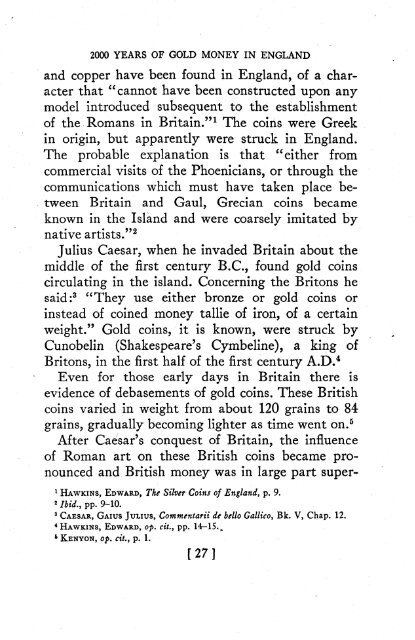You also want an ePaper? Increase the reach of your titles
YUMPU automatically turns print PDFs into web optimized ePapers that Google loves.
2000 YEARS OF GOLD MONEY IN ENGLAND<br />
<strong>and</strong> copper have been found in Engl<strong>and</strong>, of a character<br />
that "cannot have been constructed upon any<br />
model introduced subsequent 'to <strong>the</strong> establishment<br />
of <strong>the</strong> Romans in Britain."l The coiris were Greek<br />
in origin, but apparently were struck in Engl<strong>and</strong>.<br />
The probable explanation is that "ei<strong>the</strong>r from<br />
commercial visits of <strong>the</strong> Phoenicians, or through, <strong>the</strong><br />
communications which must have taken place be-<br />
. tween Britain <strong>and</strong> Gaul, Grecian coins became<br />
known in <strong>the</strong> Isl<strong>and</strong> <strong>and</strong> were coarsely imitated by<br />
native artists."2<br />
Julius Caesar, when he invaded Britain about <strong>the</strong><br />
middle of <strong>the</strong> first century B.C., found gold coins<br />
circulating in <strong>the</strong> isl<strong>and</strong>. Concerning <strong>the</strong> Britons he<br />
said: 3 "They use ei<strong>the</strong>r bronze or gold coins or<br />
instead of coined money tallie of iron, of a certain<br />
weight." <strong>Gold</strong> coins, it is known, were struck by<br />
Cunobelin (Shakespeare's Cymbeline), a king of<br />
Britons, in <strong>the</strong> first half of <strong>the</strong> first century A.D. 4<br />
Even for those early days in Britain <strong>the</strong>re is<br />
evidence of debasements of gold coins. These British<br />
coins varied in weight from about 120 grains to 84<br />
grains, gradually becoming lighter as time went on. 5<br />
After Caesar's conquest of Britain, <strong>the</strong> influence<br />
of Roman art on ,<strong>the</strong>se British coins became pronounced<br />
<strong>and</strong> British money was in large part super-<br />
1 HAWKINS, EDWARD, The Silver Coins of Engl<strong>and</strong>, p. 9.<br />
2 Ibid., pp.' 9-10.<br />
3 CAESAR, GAlUS JULIUS, Commentarii de bello Gallico, Bk. V, Chap. 12.<br />
"HAWKINS, EDWARD, Ope cit., pp. 14-15...<br />
Ii KENYON, Ope cit., p. 1.<br />
[ 27 ]

















